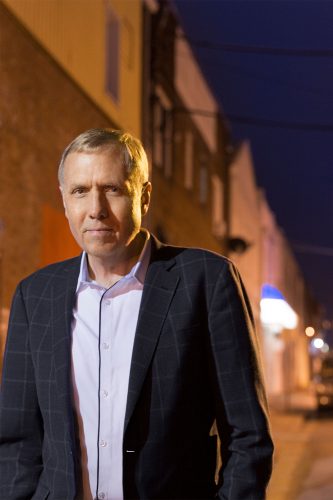
Maryland jazzman Chuck Redd, who’s played with the likes of Charlie Byrd and Mel Tormé, has been a regular with the Oregon Festival of American Music each summer in Eugene for a dozen years. A jazz drummer and vibist — that’s someone who plays the vibraphone, an instrument more familiar to listeners of a certain age — Redd’s stepping up this year to be music director of the festival.
Eugene Weekly got him by telephone a few days ago to talk about the vibes, about playing with OFAM in Eugene and, of course, about swing music — the theme of this summer’s festival.
What is the personality of the festival you’ve designed for this year?
I would say it revolves around swing, the swing feeling, in other words, a sense of joy and an uplifting, rhythmic quality. It hopefully will reflect the nature of the songs that were played between 1935 and 1945. At that time there was a lot of music that was designed to lift people up and bring them out of the Depression. It was a joyous time and the entire country was caught up in it.
That was kind of pre-1950s, so it was kind of pre-generation gap. Everybody loved the music, right? With the exception of possibly a few old fogies who didn’t care for it at all. But basically it was our music.
You know, if you had to boil it down to one person, it always goes back to Louis Armstrong. He had a profound influence on all of the musicians of the swing era.
You’ve got Byron Stripling channeling Louis Armstrong.
Absolutely. There’s no one better than Byron.
You started off on drums and then picked up the vibes. Where does the vibraphone fit in today?
It’s a misunderstood instrument. Most people have no idea what a vibraphone is.
There aren’t a ton of people playing the vibes today. Among the greats playing vibes today, there’s my friends Warren Wolf and Joe Locke and Stefon Harris, and we all know each other and respect each other, and it’s kind of a nice little family of musicians that all happen to play this interesting instrument.
The way I began playing the vibes was I was in high school, I had already been playing drums for probably 10 years and a wonderful teacher decided to play jazz for the class one day. I think she was a social studies teacher. And among the things she played was a Modern Jazz Quartet recording with Milt Jackson.
And I had a visceral need to go to the band room and play the vibes after Milt. I had already heard Lionel Hampton and I’d heard Gary Burton, but there was something about Milt Jackson’s expressiveness that made me want to go down and play. So he was my first and biggest inspiration on that instrument.
I don’t have a deep jazz background. And I’m also of a certain age, you know. When I hear vibes, it makes me think it’s 1963. Why is that?
Well, the gentleman I mentioned, Milt Jackson and the Modern Jazz Quartet, they were quite popular in 1963 or in the early ’60s.
This might’ve been a little later than ’63, but Motown has vibraphone on a lot of their recordings. So there’s a sound, a certain quality, a certain tonal color that probably you associate with that period. And I think the vibes has something to do with that.
Besides doing the programming, you’re playing in a number of concerts. Did I count 10? Is that right?
I’ve lost track, but yeah, it sounds about right. It’s a very busy couple of weeks.
I trust it’s fun, too.
It is fun. I grew up listening to swing music. One of my earliest memories was a Louis Armstrong recording that my father was playing when I was about four or five years old. And then my father was a huge Benny Goodman fan, and he loved Jimmy Lunceford and Duke Ellington, Count Basie. So I heard all this music around the house a lot. By the time I was 10 years old and I got my first snare drum, I would sit and play along with those recordings while my father took a nap on the couch. He was able to sleep. I don’t know how.
When you love your kid, you can tolerate anything.
I hope I was keeping a good beat. My father worked at Voice of America as an engineer, and he brought home a 30-minute interview with Gene Krupa. And I listened to that probably hundreds of times. Wow! And I played and played along with that music. I would play along with that recording over and over and over.
And so now I’m living the dream because I’m going to be playing a lot of that music on stage at OFAM, which is really exciting. I wish my father was here to enjoy it.
OFAM’s “Might as Well Be Swing” opens at The Shedd Wednesday, July 24, and runs through Aug. 3 with 16 evening and matinee concerts. Tickets and more info at TheShedd.org.